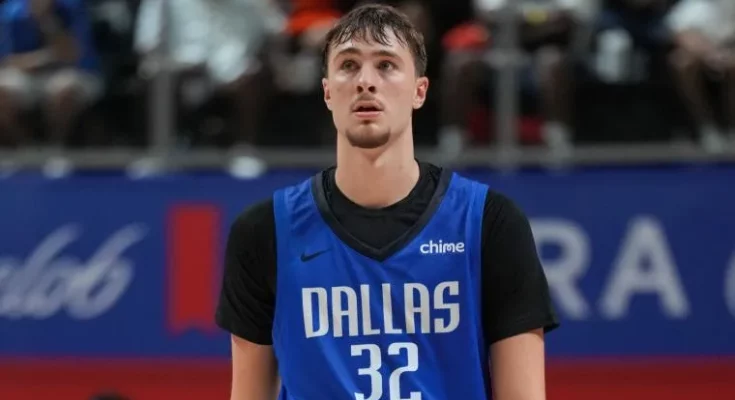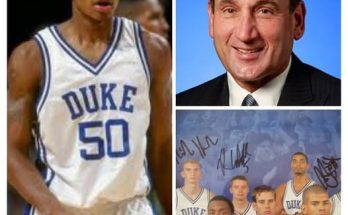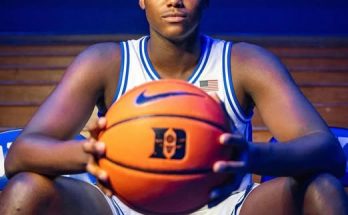The Dallas Mavericks find themselves at a pivotal crossroads as they navigate the complexities of building a championship-caliber team. Central to this dynamic is the future of Duke star Cooper Flagg, whose promising NBA journey now hangs in the balance amid the Mavericks’ aggressive win-now strategy focused on Kyrie Irving and Anthony Davis. This strategic pivot has sparked intense discussion about the direction of the franchise and what it means for their prized young talent.
Cooper Flagg entered the NBA spotlight with immense hype as one of the most highly touted prospects from Duke University. Known for his versatile skill set, defensive prowess, and mature basketball IQ, Flagg quickly became a beacon of hope for the Mavericks’ rebuilding ambitions. However, the team’s recent moves have indicated a preference for immediate success, prioritizing seasoned stars capable of delivering playoff victories over nurturing developing talent in the short term.
The Mavericks’ commitment to Kyrie Irving and Anthony Davis is unmistakable. Kyrie, a proven scorer and playmaker, brings a unique combination of offensive creativity and clutch performance that any franchise would covet. Meanwhile, Anthony Davis, despite injury concerns, remains one of the premier two-way players in the league, capable of altering games with his defense and scoring. Together, these two players form the core around which the Mavericks hope to contend for a title in the near future.
This win-now mindset poses a challenge for Cooper Flagg, who embodies the future potential of the franchise but may not immediately fit into a rotation centered on established stars. Young players like Flagg typically require time, patience, and consistent playing opportunities to refine their skills and adjust to the rigors of the NBA. In a scenario where the Mavericks prioritize veteran production and championship contention, Flagg’s minutes could be limited, potentially stalling his development.
The dilemma facing the Mavericks is not unique in the NBA. Balancing the urgency of competing now with the patience needed to cultivate young talent is a delicate act. Franchises often risk alienating their promising players if they are unable to provide a clear developmental path. For Flagg, this means the possibility of being relegated to a marginal role or even being included in trade discussions as the Mavericks explore roster moves to bolster their immediate chances.
From a broader perspective, the Mavericks’ strategy reflects the high-stakes nature of NBA competition. The window for championship contention can be fleeting, and teams often feel compelled to maximize their current roster’s potential before stars age or injuries take a toll. With Kyrie Irving and Anthony Davis commanding the spotlight, the franchise is signaling a “now or never” attitude, betting that the present is the optimal moment to pursue a championship.
The risk, however, is that the team’s future may be compromised if young talents like Cooper Flagg are marginalized or lost in trades. Flagg represents a long-term asset with the potential to be a cornerstone player. His development into a reliable contributor could secure the Mavericks’ competitiveness well beyond the immediate championship window. The challenge lies in finding a way to integrate his growth with the demands of a win-now roster.
Coaches and front-office executives must carefully manage this balancing act. Providing Flagg with meaningful playing time and development opportunities, even in a limited role, could pay dividends in the future. It’s about crafting a plan that accommodates veteran leadership while nurturing young prospects’ growth trajectories. Some teams have successfully executed this dual approach, using their stars as mentors and leveraging deep rotations to groom young players without sacrificing competitiveness.
The Mavericks’ fan base is also keenly aware of this tension. On one hand, supporters crave playoff success and the excitement of contending for a title with marquee names like Irving and Davis. On the other, there is a genuine excitement around Flagg’s potential and the promise he brings as a young player who could become a franchise pillar. Balancing these sentiments requires transparent communication from the organization about their vision and development strategy.
Adding to the complexity is the nature of Kyrie Irving’s contract and the team’s salary cap situation. With significant financial resources committed to their stars, the Mavericks have limited flexibility to build around them with additional high-cost talent. This financial constraint elevates the importance of developing cost-controlled assets like Flagg, who can contribute without burdening the salary cap. Losing or underutilizing such players could leave the team vulnerable in the long run.
Moreover, Anthony Davis’s injury history adds an element of uncertainty. While his talent is undeniable, his ability to consistently stay on the court remains a question mark. This further underscores the importance of having dependable young players who can step up when needed. Cooper Flagg’s versatility and defensive instincts could be invaluable in such scenarios if he is given the chance to grow into a reliable role.
Looking ahead, the Mavericks’ management will have to weigh various factors in deciding Flagg’s fate. Trade offers may arise, especially if other teams perceive Flagg as a valuable piece for their own rebuilds or future plans. The Mavericks could use such opportunities to acquire complementary veterans or draft assets that align with their championship timeline. Conversely, holding onto Flagg and committing to his development would demonstrate faith in the future even as they chase immediate glory.
In the broader NBA landscape, Cooper Flagg’s situation exemplifies the difficult choices franchises face when balancing the present and future. The tension between competing now and building sustainably is a defining narrative of the modern NBA. For a team like the Mavericks, caught between the allure of an immediate championship run and the promise of youth, navigating this crossroads with strategic clarity will be crucial.
For Cooper Flagg, the road ahead may require patience and resilience. Young players often face uncertain roles early in their careers, especially on teams focused on winning immediately. However, with dedication and the right support, Flagg can carve out a meaningful role and eventually become a vital contributor. His journey will be one to watch closely, as it reflects both personal ambition and the Mavericks’ organizational direction.
In summary, the Dallas Mavericks’ win-now plan centered on Kyrie Irving and Anthony Davis presents both opportunities and challenges. While it positions the team for immediate contention, it places Cooper Flagg’s future in jeopardy, raising questions about how the franchise will balance developing young talent with pursuing a championship. The decisions made in the coming months will shape not only the Mavericks’ trajectory but also the career of one of their most promising young stars. This delicate balance of ambition and development will be key to the franchise’s success in the seasons to come.



